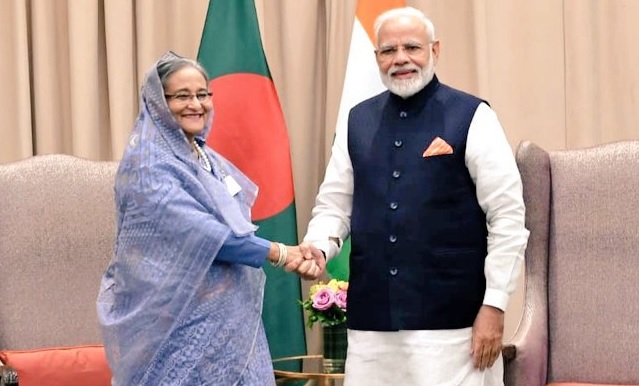In a snub to China, Bangladesh has turned its back on Chinese defence minister, Wei Fenghe who was slated to travel to Dhaka after concluding his visit to Nepal. Wei was planning to travel in India’s neighbourhood at a time when the geopolitical tussle between New Delhi and Beijing had sharpened.
“The cancellation of Wei’s visit to Bangladesh shows how countries in South Asia are trying to balance ties between the Himalayan rivals,” a person with a knowledge of the visit, who did not wish to be named told IndiaNarrative.com.
With Pakistan already in its bag as a satellite state, especially after the flagging of the China Pakistan Economic Corridor (CPEC) that links the Pakistani coastal city of Gwadar with Kashgar in China, Beijing has stepped up its push in South Asia, including Nepal, Bangladesh and Sri Lanka—countries which have traditionally gravitated towards India.
Official sources told India Narrative that India has a “reliable friend” in Sheikh Hasina, Prime Minister of Bangladesh, who has gone out of her way to bond with India’s core interests.
Meanwhile, National Security Adviser Ajit Doval has just concluded talks in the Sri Lanka, where the defence minister of Maldives was also an invitee during a trilateral maritime dialogue on the Indian Ocean. Analysts say that Sri Lankan Prime Minister Mahinda Rajapaksa, of late, has been especially receptive to India’s outreach.
The Chinese defence Minister was in Nepal to salvage some of the momentum in China-Nepal ties which India’s energetic reengagement with the Himalayan Kingdom had recently retarded. In the Great game between India and China to compete and entrench their influence in pivotal Himalayan states, China has pitched high stakes in the unity of the Nepal Communist Party, formed in 2018 after the merger to Nepal’s two communist parties – Communist Party of Nepal – United Marxist Leninist (CPN-UML) and Communist Party of Nepal (Maoist Centre).
Oli has apparently snubbed China’s controversial ambassador—Hou Yanqi, who had tried to seal a deal between the two rival factions led by the Prime Minister and his rival, Pushp Kamal Dahal. Raising the banner of national sovereignty, Oli pointed out to the Chinese envoy that Nepal did not need foreign interference to resolve its domestic political problems.
The Chinese had sensed a major opportunity to expand their influence in Nepal after New Delhi-Kathmandu ties nosedived following acute cartographic frictions between the two neighbours. Earlier this year, Nepal opposed an 80 km-border road to Lipulekh region that Kathmandu claims. Nepal responded by issuing a new map that showed Indian territories of Kalapani, Lipulekh and Limpiyadhura within the boundaries of Nepal.
India’s rearguard action to claw back influence began in October with back-to-back visits. New Delhi-Kathmandu ties were rebooted after the visit to Nepal by India’s spy chief Samant Kumar Goel, who held an extended meeting with Oli. India’s Army Chief Manoj Mukund Naravane and Foreign Secretary Harsh Vardhan Shringla followed up on Goel’s ice-breaking visit. The Hindustan Times is reporting that Nepal is keen to move forward on its relationship with India and could take a positive view on a travel air bubble with India and the Pancheshwar multi-modal project after foreign secretary Harsh Vardhan Shringla’s two-day visit. Shringla had a 50-minute one-on-one conversation with PM Oli on November 26 that saw the two countries focusing on steps to normalise relations hit hard due to the Lipu Lekh boundary row.
Nepal’s foreign minister Pradeep Kumar Gyawali is expected to be India in December for which the dates are being worked out.
Nepalese media is reporting the India and the US are trying to draw Kathmandu into the broader Indo-Pacific initiative in a bid to dilute China’s influence over Kathmandu. “[As far as I understand], the Chinese are worried about the growing American presence in South Asia, recent US-India strategic ties, its implication in the region, Nepal’s position on Indo-Pacific Strategy and Nepal’s dilemma over accepting the US’s Millennium Challenge Corporation,” said Rupak Sapkota, deputy executive director of the Institute of Foreign Affairs, a semi-government think tank under the aegis of the Foreign Ministry, and a close China watcher , as reported by The Kathmandu Post.
(This article was first published in India Narrative)

